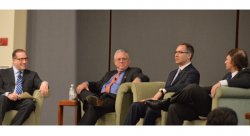Ethics and Compliance Leaders Explore The Topics of Global Bribery and Corruption
Posted in: Research

On April 28, the MA, Law & Governance, program sponsored a dynamic panel discussion dealing with global bribery and corruption.
Moderated by Professor Maurice L. Crescenzi, Jr., “Ethics and Compliance on the Front Lines of International Business,” was held in the Conference Center of University Hall and was widely attended. Professor Crescenzi serves as the leader of Grant Thornton LLP’s (big five firm) ethics and compliance services. He also serves as a graduate adjunct professor in the MA, Law and Governance program, where he teaches two “core” courses related to corporate compliance and organizational ethics.
The panel included the following thought-leaders in the areas of anti-bribery and anti-corruption: Chip Cottrell, an anti-corruption partner at Deloitte & Touche; Richard Bistrong, CEO, Frontline Anti-bribery who is also a convicted felon under the U.S. Foreign Corrupt Practices Act; and Robert Appleton, a partner at Pitney Day and former United Nations anti-corruption investigator.
The first part of the evening featured individual presentations in which each of the panelists presented on global corruption from a variety of perspectives. First, Professor Crescenzi set the context by providing an overview of the history of bribery and corruption, the movements toward greater transparency, the key laws and regulations on the books and the guiding frameworks.
Chip Cottrell then explored global trends and themes related to bribery and corruption, particularly in emerging markets. He presented the “10-80-10” rule which states that 10 percent of the people in the world will always do the right thing, 10 percent will always be inherently corrupt, and 80 percent can be influenced to behave either ethically or unethically, depending on the organizational pressures or incentives imposed on them.
Richard Bistrong’s presentation focused on white collar criminal psychology. From his own experience as a former VP of sales, Mr. Bistrong examined the pressures, opportunities, and rationalizations related to engaging in corruption and why corporate compliance programs sometimes fail.
Robert Appleton explored the investigative and prosecutorial techniques used to detect and investigate misconduct. Mr.Appleton illustrated what prosecutors look for in corruption cases by examining real-life corruption cases from his experience as the U.N. anti-corruption investigator in the Procurement Task Force.
During the second portion of the event, Professor Crescenzi facilitated a panel discussion in which the panelists ultimately answered the question, “Is it possible to conduct business ethically and still make money?” The last segment offered an opportunity for audience members to pose questions to the panelists. Many students were eager to follow-up on the various points that the panelists made during their individual presentations and during the facilitated panel discussion.
